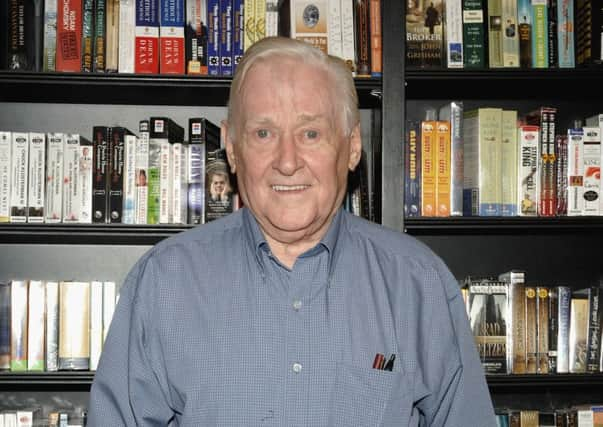Obituary: Alan Young, actor


When Alan Young left Scotland for Canada at the age of six, he must have had little idea that he would make his name worldwide as the hapless owner of a talking horse in an American sitcom with a jaunty barnyard theme song: “A horse is a horse, of course, of course, and no one can talk to a horse, of course...” It not only made him a star but also, as part-owner of the show’s rights, a fortune.
In Mister Ed (1961-6), titled after the name of the horse, Young was seen as Wilbur Post, an architect who with wife Carol (Connie Hines) moves to a house in the countryside. Wilbur is delighted to discover that the previous owners have left their horse and startled when Mister Ed starts speaking to him – and only him. The comedy revolved around the attempts by Wilbur, who works out of his office in the barn, to conceal their conversations and undo the horse’s mischief.
Advertisement
Hide AdAdvertisement
Hide AdWhile making a string of 1950s film comedies featuring Francis, a talking mule, director Arthur Lubin offered Young the starring human role in Mister Ed, based on short stories by Walter R Brooks, but he turned it down, saying: “I don’t want to work with anybody who doesn’t clean up after himself.”
In 1958, a pilot made by George Burns’s production company featured Scott McKay in the part, but Burns wanted to re-cast it for a series and reportedly told his staff: “Get Alan Young. He looks like the kind of guy a horse would talk to.” This time, he accepted and became sidekick to a palomino gelding called Bamboo Harvester and voiced by 1930s Westerns star Allan “Rocky” Lane with the catchphrase: “Wil-bur-r-r-r-r.”
To give the impression of the horse talking, his trainer, Les Hilton, initially placed soft nylon thread between the gums and upper lip, resulting in Mister Ed trying to remove it. In time, the need for the nylon disappeared and the horse learned to move his lips when the trainer touched his hoof and, eventually, when Young finished his lines.
The actor, who never followed up this sitcom success, was born Angus Young in North Shields, Northumberland, the son of John, a dockyard worker and tap dancer, and Florence (née Pinckney), a singer whose ancestors included William Pinckney, one of those who signed the United States’ Declaration of Independence in 1776. (Apparently, at the age of 20, Young changed his forename legally because he was frustrated at it being mispronounced “Agnes”.)
Advertisement
Hide AdAdvertisement
Hide AdHe was still a toddler when his family moved to Edinburgh after his father took a job as a mine worker in his native Scotland. Several years later, they emigrated to Canada and lived in British Columbia. They eventually settled in Vancouver, where Young’s father worked in a shipyard.
Frequently bedridden with debilitating asthma while growing up, Young gained a love of radio comedy, often wrote down the jokes he heard and started scripting his own material. By the age of 17, having secured an office job at a local radio station, he was performing on the airwaves.
Three years later, he was starring in The Alan Young Show (1940-44), disrupted only by wartime service in the Royal Canadian Navy. After being spotted by an American agent, he moved to New York, where the programme ran from 1944 to 1949. In the United States, he also made his film acting début in Margie (1946), as a schoolgirl’s nerdy boyfriend.
When the radio series was axed, Young went on a stage tour doing stand-up comedy and playing the bagpipes, but he was back in front of a mass audience very quickly. The Alan Young Show transferred to American television (1950-53), winning two Emmy Awards in 1951 – Best Actor for Young and Best Variety Show for the programme.
Advertisement
Hide AdAdvertisement
Hide AdHis further film roles included an asthmatic bachelor in Chicken Every Sunday (1949), a dim-witted student in Mr Belvedere Goes to College (1949), a country bumpkin in the musical Aaron Slick from Punkin Crick (titled Marshmallow Moon in the UK, 1952, and his first starring part), the Christian tailor of the title in Androcles and the Lion (1952), secretly rich singer Charlie Biddle in the musical Gentlemen Marry Brunettes (1955, alongside Jane Russell), the village piper in Tom Thumb (1958) and, with a Scottish accent, both the time traveller’s loyal friend David Filby and that character’s son Jamie in The Time Machine (1960, based on the HG Wells novel).
After Mister Ed, Young retired from acting for several years to found a broadcast division of the Christian Science Church, of which he was a member.
He was subsequently in demand as a voice artist on television as Keyop and 7-Zark-7 in Battle of the Planets (1978-80), Mr Frump in Spider-Man & His Amazing Friends (1981), Farmer Smurf in The Smurfs (1981-9), the Cyclops Computer in The Incredible Hulk (1982-3) and Haggis MacHaggis in The Ren & Stimpy Show (1994-5).
With a Scottish accent, Young also voiced Scrooge McDuck, the stingy billionaire uncle of Donald, in the film Mickey’s Christmas Carol (1983), on television in a succession of series, from DuckTales (1987-90) to Disney’s Mickey Mouse (2015-16), and in video games.
Advertisement
Hide AdAdvertisement
Hide AdThe actor, who was seen in a cameo role working in a flower shop in the 2002 Time Machine remake, wrote two autobiographies, Mister Ed and Me (1995) and There’s No Business Like Show Business... Was (2006).
Young’s three marriages – to Mary Grimes (1941-7), singer Virginia McCurdy (1948-95) and Mary Chipman (1996-7) – all ended in divorced. He is survived by Alan and Alana, the children of his first marriage, and Cameron and Wendy, those of the second.